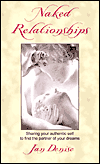
This slim book is packed with information for becoming a truly honest ('naked') person and in so doing, achieving true happiness. The book is not perfect, but I found value in the author's words and would recommend it as an addition to your library. Many of us have spent (or are spending) much of our lives being dishonest -- not out of conscious deceit or a desire to cause pain. But we have created self-images that are not sincere, or we portray ourselves to others in ways that make us more acceptable to them. Despite the somewhat provocative title, I found Naked Relationships to be of more value for what it can teach us about falling in love with our selves than to find the 'perfect' partner. Being naked is not about sexuality, or tantra, or even whether one is wearing clothing. The author's idea of being naked is being honest, totally and deeply honest with oneself, your loved ones, and with the world. I found the first half of the book to be frustrating. Ms. Denise spends a lot of time telling the reader to be honest. How wonderful it is, how freeing, how refreshing and how being honest will positively transform our lives. Unfortunately, she does not spend much time telling us how to go about becoming honest. For example, if we can not see our personal deceptions, then how can we know when we are being honest in the world? The second half (beginning with Chapter Nine "Types of Love -- One of Them is Perfect") is much better. Here the different types of intimacy and commitment are discussed. As well, we are shown how these factors create patterns within our relationships. I especially found the "Triangle of Love" chart from Robert J. Steinberg to be wonderfully useful and accurate. I am not sure how much of Naked Relationships the reader will find new or refreshing. I think Ms. Denise avoids the pitfalls of 'all love is good' and 'if you love, all will be well' that so many new age authors seem to prescribe as the cure for the world's ills. There still is a lack of exercises to perform to create self-change, but there are many things to think about and hopefully act upon to create that change. Perhaps this book is best read while in therapy so you have a safe place to explore yourself, with guidance. For some, the relationships we are in will provide that safe place, for other's it will stunt our growth. Certainly, the ability to actually live honestly is breathtakingly difficult. I applaud the attempt to describe why we should do so. This is a book that requires courage and ruthless compassion to use as the tool that it is. In closing, here is a quote from Chapter Two, Forgiveness -- lighting the dark corners: "You don’t really know someone until you have seen his or her darkness. And you haven't really loved someone until you have forgiven that darkness." ~review by Lisa Mc SherryAuthor: Jan DeniseHampton Roads, 2002
